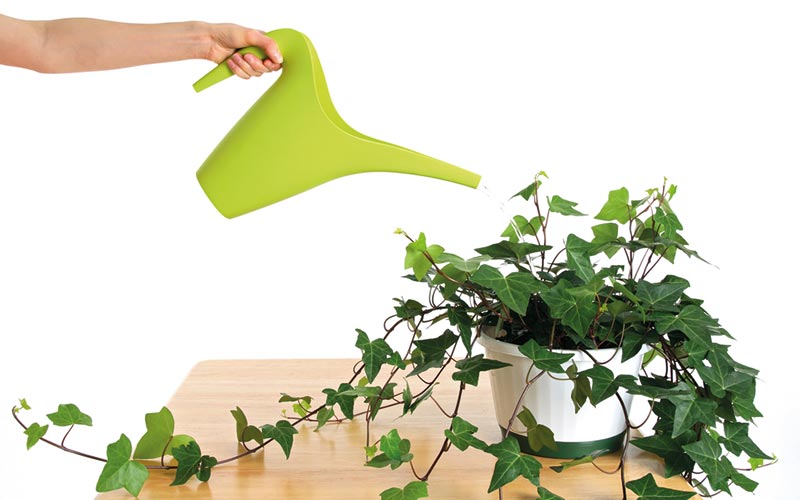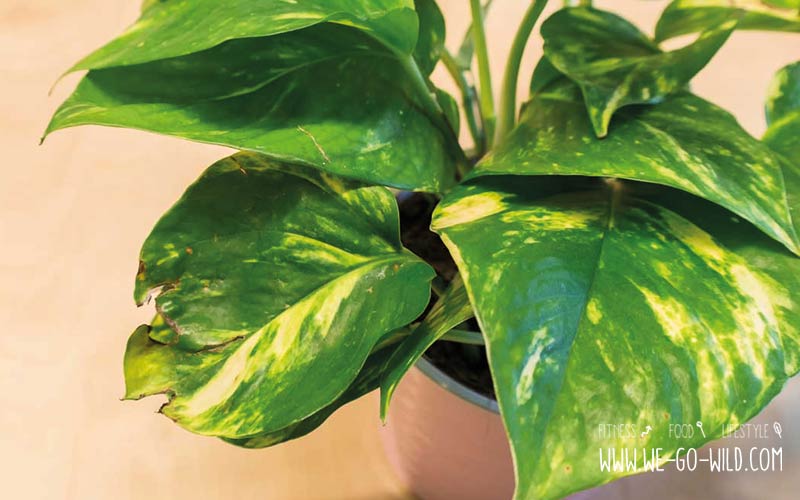Plants in the bedroom help you fall asleep and sleep through the night. Which plants are the best for a restful sleep, you can find out here.
Plants have conquered our living space. Gone are the days when a lonely Benjamin waited in a dark corner for his salvation.
Plants are decorative and with stylish plant containers blend into the decor.
Sometimes lush, sometimes minimalist - plants exist for every taste. However, the green roommates are much more than a splash of color.
Houseplants contribute to our well-being and help us get a deep and restful sleep.
Table of contents
By the way, it should also help if you at least use the Basic rules of Feng Shui in the bedroom observed. This includes the arrangement of furniture, mirrors and some more.
In general, placing plants in the bedroom has a lot of advantages: they produce oxygen, improve the air quality of the room and are beautiful to look at.
However, those who suffer from headaches should be careful, because especially fragrant plants can cause them. Bow hemp, rubber trees, dragon trees and ivy are a good choice for your bedroom because they do not bloom.
How houseplants provide better air quality
Plants create a feel-good atmosphere. Only those who feel good can fall into a deep sleep. Sleep deprivation makes us sick and in the worst case can lead to diseases of the psyche.
Green leaves have a calming effect. People who surround themselves with plants are relaxed. Many plants are not only air filters, they release into the air ingredients that act against health complaints.
Various pollutants accumulate in our indoor air. Our presence and breathing alone enriches the air with CO₂.
Evaporation from carpets and furniture contributes to air pollution. Of course, we ventilate regularly to ensure an exchange of oxygen.
But who consistently follows the recommendations of regular shock ventilation? Almost no one.
And even if it does, there is a regular increase in the concentration of pollutants. Air-purifying plants ensure consistently good air. Throughout the day, green plants perform photosynthesis, filtering carbon dioxide from the air and leaving oxygen behind.
Some plants in the bedroom are able to filter pollutants such as formaldehyde, benzene and trichloroethane and convert them into vital oxygen.
11 natural fatigue makers you should know about!
Cleaning the air? We do clean regularly!
Cleaning is in our blood. We vacuum and wipe and carefully remove every visible crumb. But what about our air?
Through open doors and windows, with clothes and shoes, and perhaps also through the dog, we carry things into our interior that we cannot see with the naked eye.
We can not remove these particles from the air with rags and chemicals. Strong smell of our interior suggests a harmful effect on health.
And plants in the bedroom counteract this pollution. Through their leaves, air-purifying plants absorb pollutants and return clean air back into the room.
In order for plants to perform this task, the leaves should be dusted regularly. For an optimal indoor climate are 15-18 plants on an area of 170 m² recommended.
Various plants provide a wide range of air purification and not only in the living room.
Plants in the bedroom can enrich the room air with valuable substances that support a gentle fall asleep and ensure a healthy sleep.
House dust can cause restless sleep for allergy sufferers. The dust that accumulates on plants and other objects in the room must be cleaned up regularly. Therefore, you should regularly dust the plants or wipe them with a damp cloth.
How to improve the indoor climate in 4 easy steps!
Myth: Plants breathe away my oxygen at night, is it true?
The idea that plants can breathe oxygen away from you while you sleep is a much-discussed myth on the Internet. However, you can (literally) breathe deeply.
CORRECT: at night, photosynthesis and thus oxygen production comes to a halt. Plants take up oxygen at night. But because this value is so tiny, it has no effect on our sleep. You would have to cover the whole room from floor to ceiling with plants to notice that.
There is also the idea that plants can produce oxygen at night. It is true that certain thick-leaved plants release the oxygen they produce during the day at night. But as a rule, plants for the bedroom cannot and do not do this because they need daylight to produce oxygen.
Plants are great air disinfectants and can quickly improve the atmosphere in your bedroom. And that is most definitely good for a restful sleep. Pollutants are efficiently filtered by certain plants, such as the green lily or the dragon tree.
The humidity in your bedroom also determines whether you can sleep well or not. Plants such as sword ferns and monstera have a large leaf surface through which they can release moisture. This ensures optimal humidity in the bedroom.
Too dry air is a torture, especially for allergy sufferers. Anyone who suffers from a dust mite allergy should rely on air-humidifying plants.
Sleep healthier with more oxygen and less CO2
Many of us know this. We go to bed tired and yet sleep doesn't come. Or we wake up at night, sleep restlessly and feel exhausted in the morning.
Common causes of sleep disorders are stress and worry. But a high CO2 concentration in the bedroom can also disturb sleep.
We produce CO2 with our breathing. Every time we exhale, we release carbon dioxide into the environment. At some point, the oxygen is used up and breathing is disrupted.
In the course of a night, the CO2 content increases. But a selection of wrong plants in the bedroom can also disturb the night's rest.
These are the best plants for the office!
By the way, if you are a very restless sleeper like me, I can give you a recommend homemade sleeping spray. You simply spray the sleeping spray on your pillow before going to bed and nothing stands in the way of a relaxing night :).
Top 9 air purifying plants in the bedroom for restful sleep
We need sleep. Sleep serves the recovery of our body, our strength is regenerated and we can start the next day. Our skin is plump, fresh and soft and we feel good.
Unfortunately, this is not always the case. For a deep sleep, which brings us back the necessary energy, there are often too many disturbing factors. Noise, bad indoor climate and most often we neglect our bedroom when furnishing it.
Yet it is precisely here that the atmosphere should be right. A good selection of bedroom plants improves sleep and health.
These plants are particularly easy to care for and therefore well suited for beginners. :)
This is what you can do against condensation on the window!
1. the monocot as a plant in the bedroom
A true all-rounder among the air-purifying plants is the monocot. Its shiny green leaves make the easy-care plant a popular decoration.
As a plant in the bedroom, the monocot filters the harmful substances benzenes, trichloroethylene and formaldehyde from the air. For this, the monocot is content with a shady place and a weekly watering. The monocot enjoys great popularity among the bedroom plants.
The monocot forms white flowers when well cared for. The flowers emit a light fragrance and provide the necessary relaxation for falling asleep.
In addition, the flowers release moisture into the air and improve the indoor climate. However, those who keep the monocot as a plant in the bedroom, must be careful. The plant is poisonous and should be kept out of reach of animals and children.
2. the bow hemp as a bedroom plant for better air

The plant filters harmful substances from the air, similar to the monocot.
In addition, the bow hemp also releases oxygen into the air at night.
A feature that is very advantageous for plants in the bedroom.
So we can breathe air enriched with oxygen all night and get healthy and restful sleep.
Bow hemp is an optimal and modern bedroom plant. The broad leaves provide a pleasant indoor climate.
The plant requires little water and can withstand prolonged periods of drought. Bow hemp is said to have the property of acting against headaches and high blood pressure.
3. aloe vera as an ideal plant in the bedroom
Aloe vera is active day and night for the oxygen balance. According to a study by NASA, the exotic plant is one of the most effective air improvers.
The exotic plant is surprisingly frugal. Little light and occasional watering is enough for the "immortal plant".
An aloe vera forms many offshoots, so that even your friends can have peaceful sleep with this air-purifying plant. From freshly cut leaves comes out the skin-caring gel, which we know from cosmetics and is a boon for irritated skin.
Dark apartment? These plants grow even without light!
A homemade aloe vera cream is perfect for dry skin. Of course, we tried it and mixed a very quick aloe vera ointment. Also for small cuts, sunburn or insect bites provides the Aloe vera gel fast relief.
4. ivy as an air purifying plant in the room.
If you've only thought of common ivy as a garden plant, you've done this climbing plant an injustice. The serrated leaves are able to filter mold spores from the air.
Mold in the apartment, especially in the bedroom is a nightmare. Long before infested areas are visible, the spores are present in the air.
They interfere with breathing and deprive us of healthy sleep. In addition, mold can trigger allergies and asthma.
Among the plants in the bedroom should be ivy, because after only 12 hours ivy filtered mold from the air. In the long term, ivy regulates humidity and provides a comfortable indoor climate.
But beware: ivy is poisonous and should be kept out of reach of children and animals.
5. the Dieffenbachia as a bedroom plant
Dieffenbachia is not only a fantastic air purifier, it incidentally creates a warm atmosphere in the apartment and bedroom. The large and color speckled leaves and tall growth make popular plants in the interior.
This plant likes it bright and gladly in a little sunny. As well as a uniformly moistened soil.
Dieffenbachia, but also mountain palms and Kentia palms counteract bad odors. Unpleasant odors, such as those left by smokers, do not settle in the room. Plants in the bedroom like palm trees provide a pleasant oasis of well-being.
Beauty sleep is real - How to wake up beautiful!
6. the classic houseplant
In the list for the best plants in the bedroom, can not miss the good old rubber tree.
With its leaves, it filters a lot of air and even pulls pollutants from floor coverings and wall paints.
At first usually very small, it can grow to a really stately size and is suddenly larger than ourselves.
With its size, it can easily stand on the ground, and its leaves need to be cleaned regularly.
Then it is the plant for all retro lovers.
Alternatively, you can put a green lily in the room, which also looks great in a hanging pot.
7. the ivy provides good air
Also nostalgic look is the ivy. Its tendrils have already decorated the walls of many generations. And quite rightly, it provides a generally good indoor climate.
Ivy is a good hanging basket plant, making it a great bedroom plant for pet owners.
And best of all, if you let plants grow in your bedroom, like ivy, you don't have to worry about maintenance. Or at least hardly at all.
For this houseplant is very easy to care for. It does not need much water and can grow well even in low light. A few hours of brightness is quite enough for her.
8. gardenias as plants in the bedroom
Once again something fragrant. If the gardenia is in bloom, the scent is a pure soporific.
It's like a favorite perfume, it permeates the air and you close your eyes as soon as you touch the pillow and fall into a deep relaxed sleep.
These low-maintenance houseplants are indestructible!
9. green lily filters bad air
An absolute master among the air-purifying plants m bedroom is the green lily. It is said to be able to remove about 90 % of formaldehyde (carcinogenic!) from the air.
And it can additionally absorb odors such as smoke. At the same time, the green lily is quite easy to care for. It quickly forgives if you forget to water it. No matter if sunny or shady. The green lily adapts to pretty much any location.
Tip: plant fragrance for the bedroom
The ivory-colored flowers of jasmine emit a light fragrance that promotes relaxation and ensures a restful sleep.
After a restful night, you will be more productive and full of energy the next day. The well-scented plant is usually found in warm climates, making it ideal for indoor use.
However, jasmine needs enough daylight to grow beautifully. For beginners, this plant is rather unsuitable. The same applies to lavender. It thrives best outdoors.
If you want to benefit from the scent of jasmine or lavender, but decide against complicated plants in the bedroom, you can also order an essential oil from Amazon and simply drip it into a small bowl. Do not put directly to the head!
How to choose the best plants in the bedroom?
When choosing plants in the bedroom, you need to take your time. Because there are actually plants that can disturb our sleep. On the one hand, this is through disturbing fragrances. And on the other hand, there are also plants that produce CO2 at night - they are very few, but they do exist.
Strongly scented houseplants such as hyacinths or jasmine can trigger allergy symptoms and migraines in sensitive individuals. In general, they do not always provide a restful or peaceful sleep. If you're prone to migraines, we recommend switching to unscented plants and avoiding even supposedly relaxing scents like lavender in the bedroom.
Poisonous houseplants or plants with increased allergy potential such as spurges are not ideal. Although many of them have air-purifying properties, you should first check their compatibility before permanently accommodating the green roommates in your room.
You also need to make sure that the location is right for the plants. While some are sun hungry, others can never get enough shade. How light or dark is it in your room?
Is mold in the potting soil harmful?
Plants in the bedroom - don't do that, my grandma used to say. But whether or not to have plants in the bedroom is an individual decision. It's as personal as your choice of clothing.
A common prejudice is that mold forms in the potting soil and ruins the indoor environment. Mold forms whenever the plant gets more water than it uses. If potting soil is wet for a long period of time, bacteria can form and fruit flies can settle.
Therefore, always water sparingly and rather choose plants in the bedroom that like to dry.
Fresh after repotting, the whitish film is particularly fond of appearing on the surface of the soil. Look carefully, sometimes it's just lime, which is in the watering water. It could also be mold, which has no place in a bedroom. Our tip: Keep the plants in hydroponics or at least add a suitable drainage layer (made of expanded clay, for example) to the bottom of the planters.
The type of potting soil you use also has an impact on mold growth. Fine-textured soil with a high compost and black peat content is more susceptible to mold. Relatively resistant to the white fuzz on the soil is a high-quality, low-compost substrate made of white peat and mineral components.
Our conclusion
In 1989, a NASA study confirmed the air-improving properties of green plants. Many prejudices have so far prevented the entry of plants into the bedrooms.
But especially if you suffer from sleep problems, plants can provide a better and healthier sleep. For just under 10 m² of bedroom you need one plant, which is not much, but can bring you many health benefits. Especially a light scent can change the atmosphere in the bedroom and provide a moment of happiness before falling asleep.
To browse further:
* Advertising & affiliate links: Our website is financed by advertising and affiliate links. As a partner of linked stores (e.g. Amazon) we earn from qualified sales.
Read more











